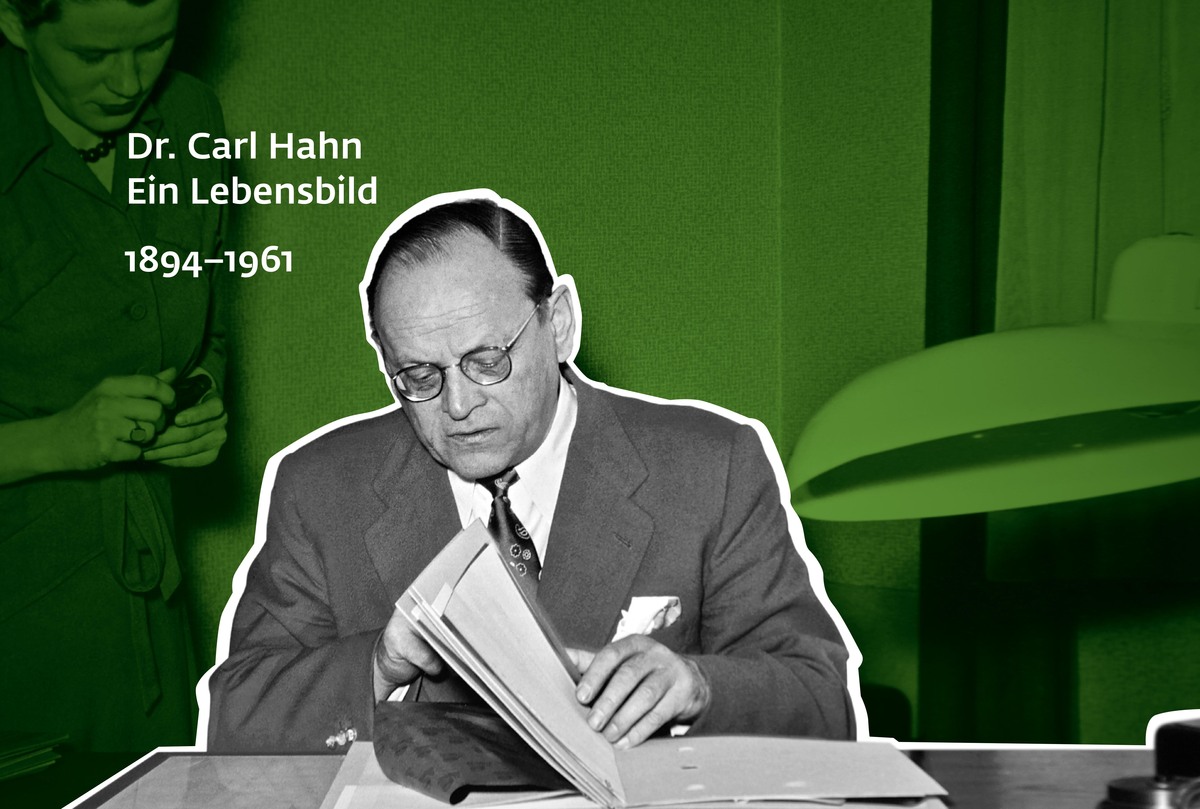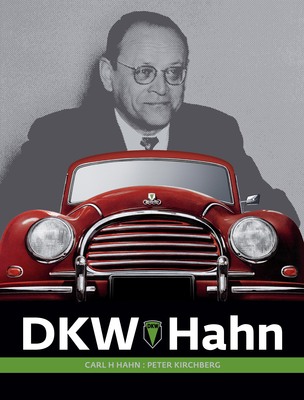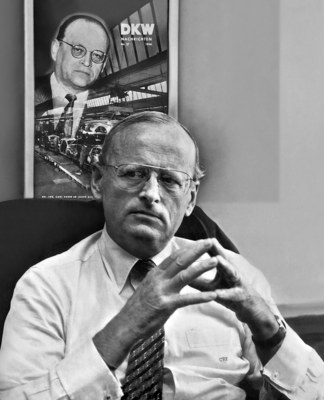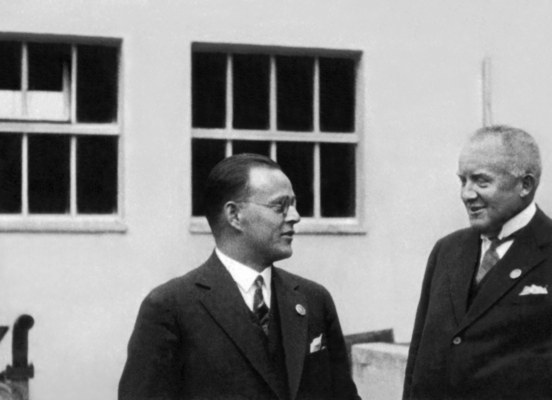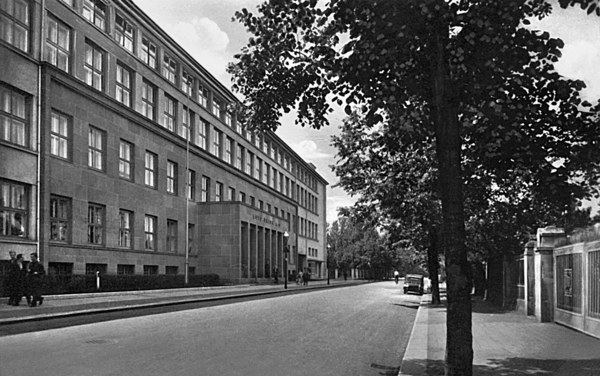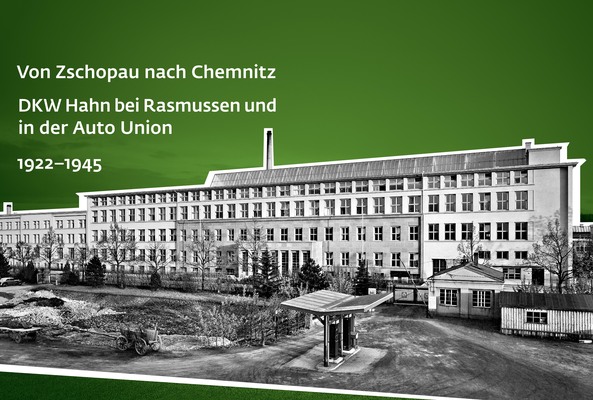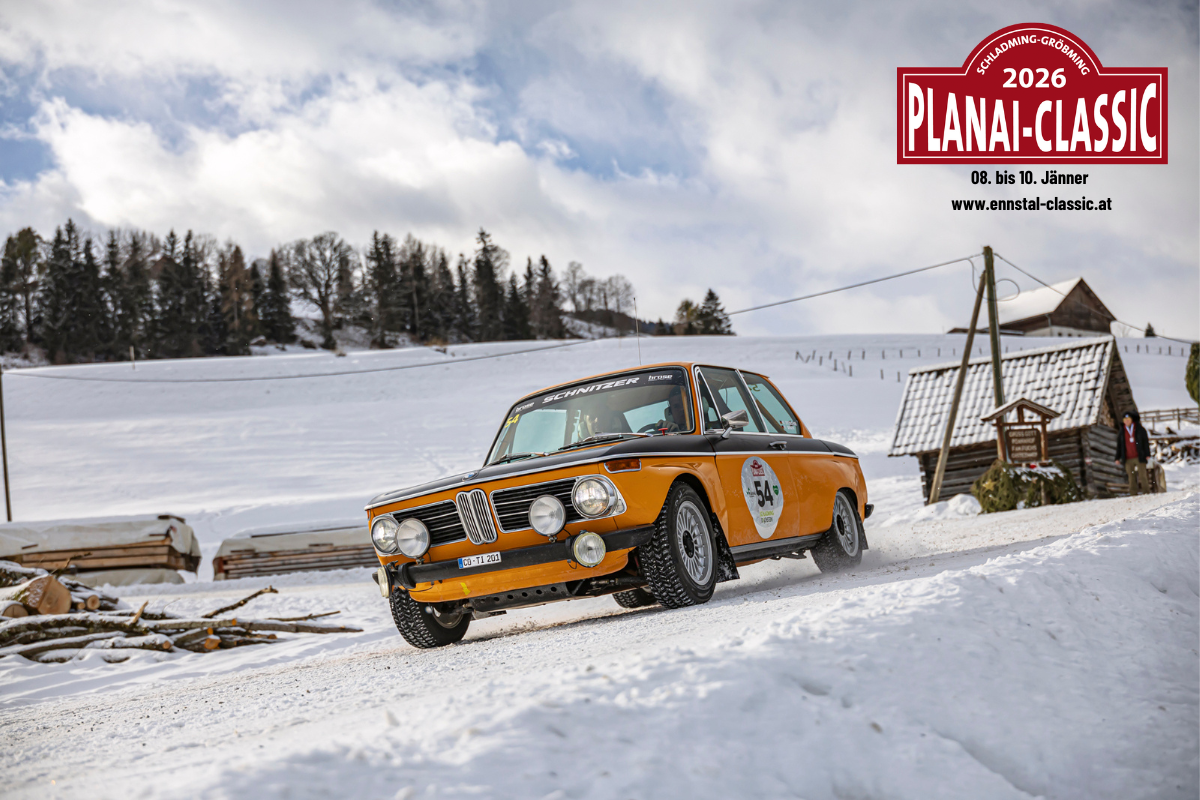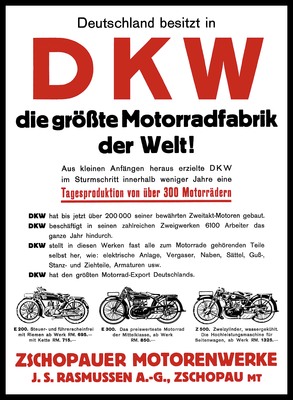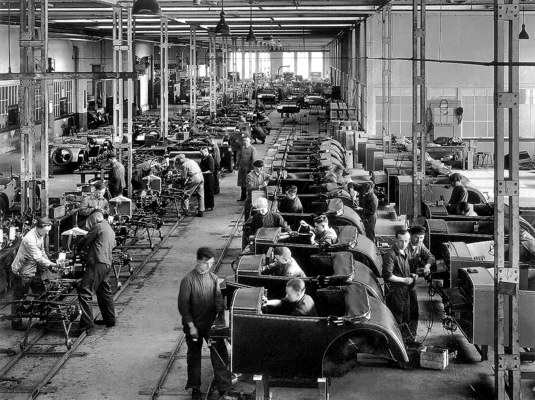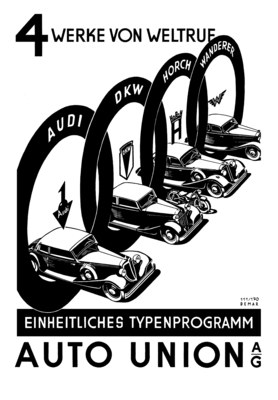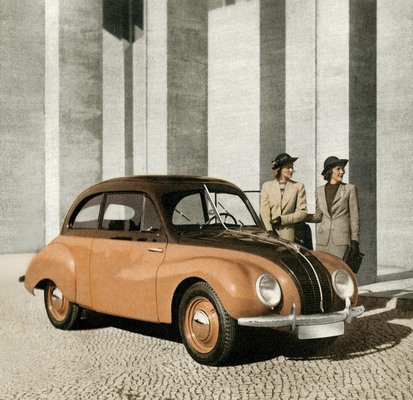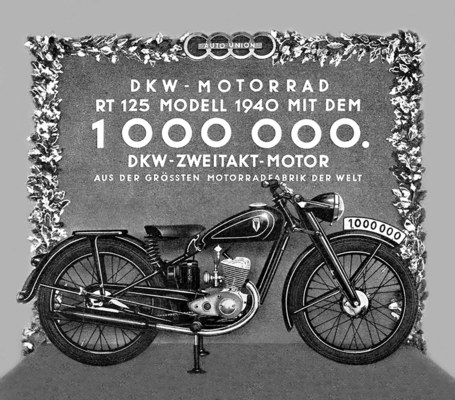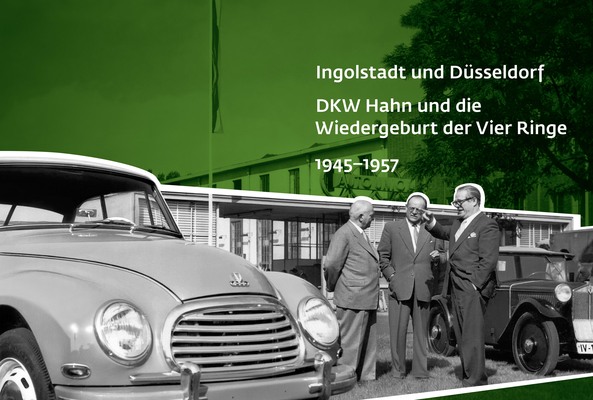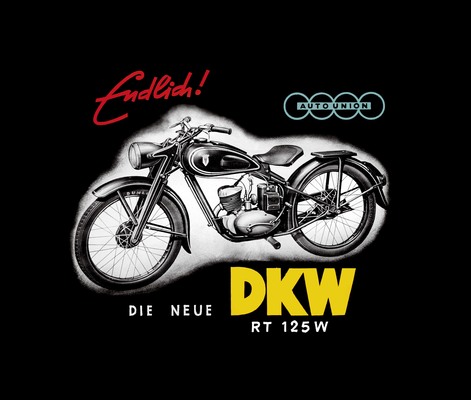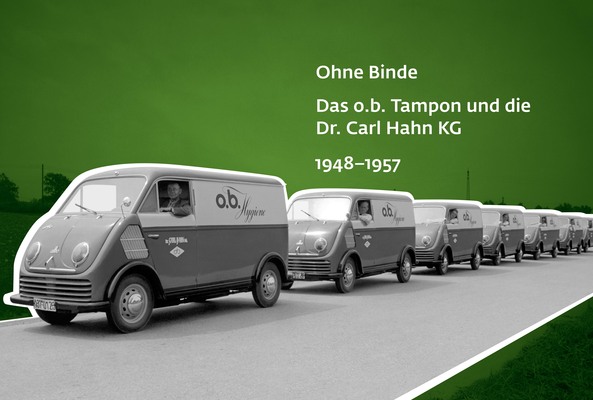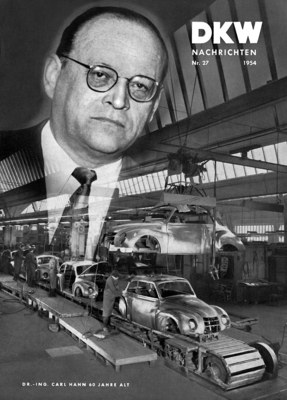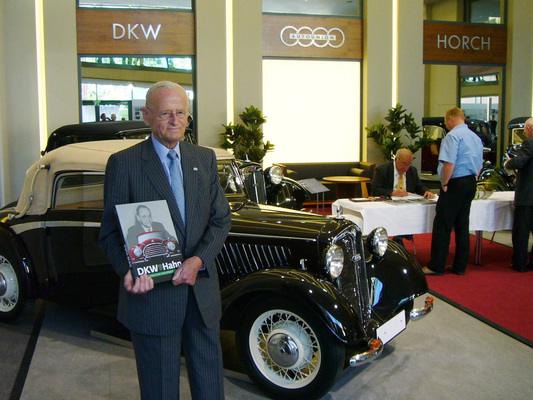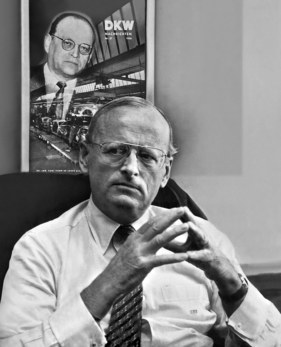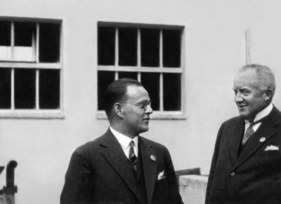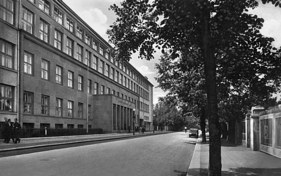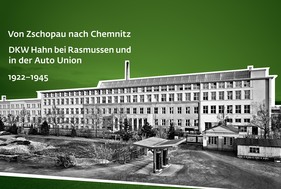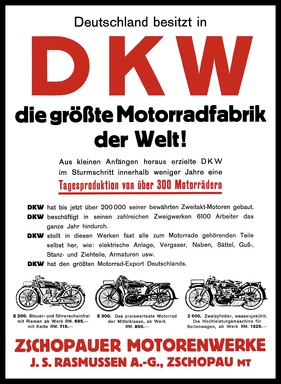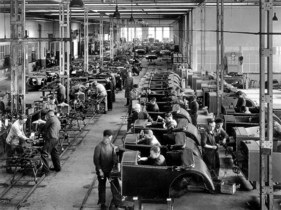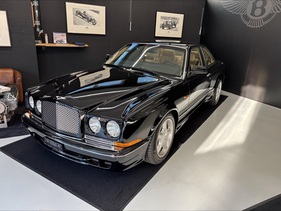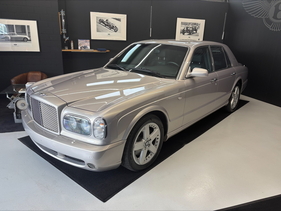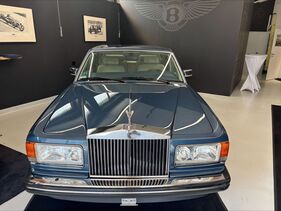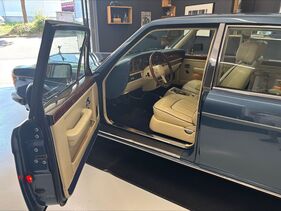Carl Hahn (1894 - 1961) worked more or less continuously for DKW and Auto Union for 35 years in his 67 years of life. His passionate commitment and dedication to DKW and the inseparable two-stroke engine earned him the honorary name "DKW-Hahn" in the industry early on. Under this title, his son, former VW CEO Carl Horst Hahn, and the doyen of Saxon automotive history, Peter Kirchberg, have now written a biography that captivates the reader with the context of entrepreneurial activity at DKW and Auto Union.
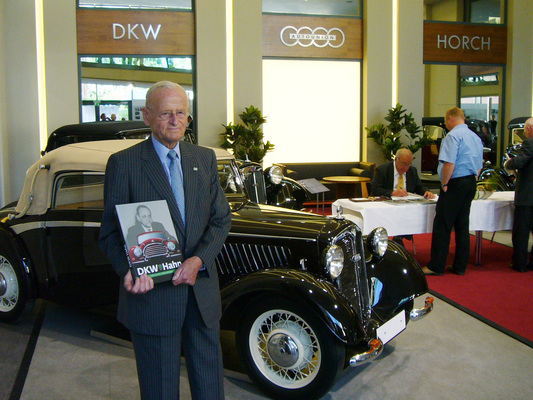
One biography - two co-authors
In 2012, at the closing banquet of the Horch Classic, the former VW manager revealed to Kirchberg: "I want to publish a biography about my father and I already know who will write the book. You!". "If a Carl Horst Hahn wants it, you can't refuse," Kirchberg summarizes the impetus for the book's creation at its presentation in the historically charged surroundings of the old Audi plant in Zwickau, which today houses the August Horch Museum of Audi Tradition.
The life story of an entrepreneur
The result is a more than 200-page life story about a manager who lived through all the ups and downs of the last century. His entrepreneurial activities went far beyond his work at DKW and Auto Union. Two world wars, economic crises, inflation, personal happiness, but also the search for a proverbial new acquisition after fleeing Saxony. The book can be roughly divided into two parts.
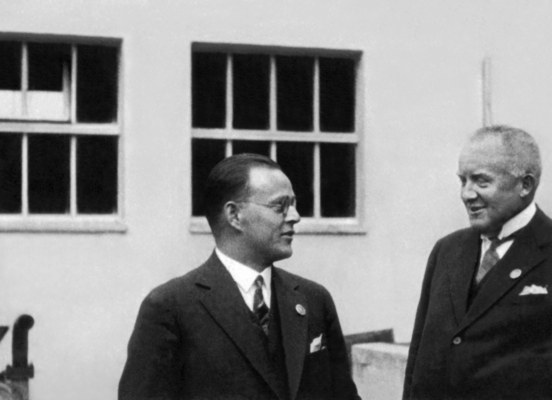
Carl Horst Hahn takes on the first part with the family history and Peter Kirchberg the second part with Hahn's importance in the automotive industry. "I was less interested in what kind of entrepreneur Hahn was, I was more interested in the time in which Hahn was an entrepreneur," says Kirchberg, explaining his approach to writing his part of the book. In particular, the development of DKW, later the productive years at Auto Union in Saxony and the revival of Auto Union in the western zones are impressively and comprehensibly described by Kirchberg in his eloquent writing. Fortunately, neither the sources of the Hahns' private archives nor the sources of the DKW and Auto Union company archives have become a burden for the authors. On the contrary, the wealth of facts, descriptions and extensive photographic material characterize not only Carl Hahn. Hahn's biography combines economic, technical, life and contemporary history.
Dr. Ing. Carl Hahn
Carl Hahn was born in Bohemia in 1894. He graduated from high school in 1914, the year of the war, and was drafted as soon as he left school. Through fortunate circumstances, he survived the man-eating First World War and completed his studies at the University of Natural Resources and Life Sciences in Vienna.
Through a friendly mediation, he took up the position of secretary at Jörgen Skafte Rasmussen in Zschopautal in Saxony in 1922, where he quickly rose to become commercial director and Rasmussen's right-hand man thanks to his dedication and talent. Hahn recognizes the potential of the company and its products and it is not least thanks to him that DKW becomes the largest motorcycle factory in the world at the end of the 1920s. Excellent customer service, installment payment systems, dealer training and high product quality can all be traced back to Hahn's work.
The relationship with Rasmussen soured when he was forced to merge his heavily indebted company into Auto Union AG in 1931. While Hahn recognized the opportunity for DKW in Auto Union and supported its foundation, Rasmussen accused him of betrayal. Despite this personal disappointment, Hahn stood up for Auto Union and made the DKW brand the decisive, supporting pillar of the new company. It is he who takes the initiative and is the only German car manufacturer to stand up to the upcoming KdF-Wagen.

As early as 1935, he initiated the development of the DKW F9, which would not roll off the production line until 15 years later at Auto Union GmbH in Ingolstadt and at IFA in Zwickau and Chemnitz.
Soon after fleeing to the Western zones, he committed himself to the reconstruction of Auto Union in Ingolstadt, took on a position as Managing Director and tried to help the company make a new start with the proverbial DKW virtues. In doing so, he drew on his marketing expertise, cultivated the DKW dealership and was an inveterate advocate of the two-stroke principle.
As early as 1953, he sketched out Auto Union's vision for the successor to the DKW F91: "A car with a displacement of 1.2 liters, a two-stroke engine and the interior dimensions of a Fiat 1100 would be a fine car for Auto Union to tackle."
However, the car was not presented until 10 years later as the DKW F 102, now already developed under the wing of Mercedes. Hahn did not live to see this moment. However, the F 102 was soon to return Auto Union to the road to success, thanks to the Mercedes four-stroke engine and renamed Audi.
Co-author Hahn, then VW Board Member for Sales, already saw salvation for VW in a multi-brand strategy for the Wolfsburg-based group in 1965, the circle of father and son had come full circle.
The significance that Auto Union was soon to develop for VW can still be seen today in the first generation of the Polo, Golf, Scirocco and Co. Know-how from Ingolstadt helped VW out of the crisis it had brought upon itself. What can only be hinted at briefly here, despite the rather detailed review, is a detailed, excellently researched and readable history in the book, which also traces the life and work of Carl Hahn thanks to the excellent photographic material.
Detailed, also our conclusion
The book reflects the life experience of more than 170 years of the two authors Hahn and Kirchberg. Listening to them talk about the circumstances of the time in this book, you realize that they themselves know a lot about several decades of biography from different perspectives. This is probably one of the reasons why they succeed in conveying a biography of Carl Hahn that goes far beyond the usual level, covering both technology and life.
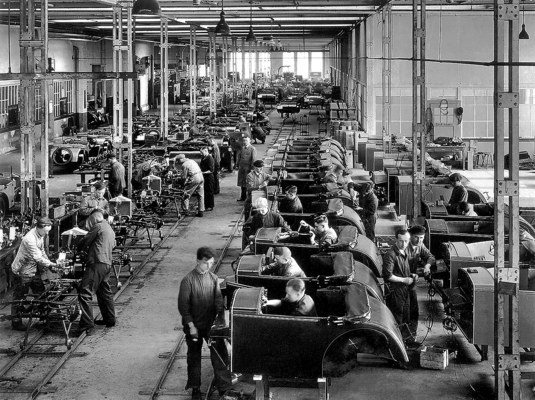
It is precisely the elaboration of the person as well as his entrepreneurial vision and intention that are fluently and unpretentiously combined with contemporary and economic history on different levels. It is due to the detailed approach that this book is not only worth reading but also extremely exciting.
Only absolutely profound connoisseurs of Auto Union's company history know that Carl Hahn, in addition to his position on the board of directors at Chemnitz Auto Union, also had a second commitment at Maschinenfabrik Germania in Chemnitz, which began with a reorganization. Or that Carl Hahn KG was innovative in Germany from 1948 with the ob-Tampon in the feminine hygiene sector.
This review can only partially reflect the content of the book. But that's what the book is for. Or a fireside chat with Carl Horst Hahn and Peter Kirchberg in the August Horch Villa in front of the old Audi plant in Zwickau. But only very few people will be granted such a moment. That's why we recommend it to friends of DKW, Auto Union and anyone interested in German automotive history: In two-stroke in this book: read, marvel, read, marvel, read, marvel. Even the price of the book could be from DKW.
Bibliographical details
- Title: DKW Hahn
- Authors and editors: Carl Horst Hahn and Peter Kirchberg
- Language: German
- Publisher: Publisher, Heimatland Sachsen, 1st edition 2016
- Format: 310 x 230 mm, hardcover bound
- Scope: 208 pages, 400, mostly b/w images
- Price: € 19,95
- ISBN: 978-3-910186-93-4
- Buy/order: Online at amazon.de, on the website "Heimatland Sachen " or in bookstores
